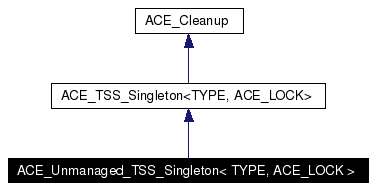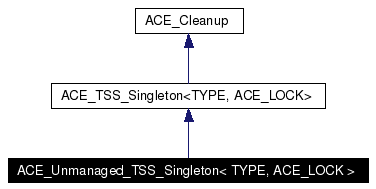
#include <Singleton.h>
Inheritance diagram for ACE_Unmanaged_TSS_Singleton< TYPE, ACE_LOCK >:


Static Public Member Functions | |
| TYPE * | instance (void) |
| Global access point to the singleton. | |
| void | close (void) |
| Explicitly delete the singleton instance. | |
| void | dump (void) |
| Dump the state of the object. | |
Protected Member Functions | |
| ACE_Unmanaged_TSS_Singleton (void) | |
| Default constructor. | |
Static Protected Member Functions | |
| ACE_Unmanaged_TSS_Singleton< TYPE, ACE_LOCK > *& | instance_i (void) |
| Get pointer to the Singleton instance. | |
Static Protected Attributes | |
| ACE_Unmanaged_TSS_Singleton< TYPE, ACE_LOCK > * | singleton_ = 0 |
| Pointer to the Singleton (ACE_Cleanup) instance. | |
This version of ACE_TSS_Singleton can be used if, for example, its DLL will be unloaded before the ACE_Object_Manager destroys the instance. Unlike with ACE_Singleton, the application is responsible for explicitly destroying the instance after it is no longer needed (if it wants to avoid memory leaks, at least). The close() static member function must be used to explicitly destroy the Singleton.
Definition at line 216 of file Singleton.h.
|
||||||||||
|
Default constructor.
Definition at line 28 of file Singleton.inl.
00029 {
00030 }
|
|
||||||||||
|
Explicitly delete the singleton instance.
Definition at line 381 of file Singleton.cpp. References ACE_TSS_Singleton< TYPE, ACE_LOCK >::cleanup(), and ACE_Unmanaged_TSS_Singleton< TYPE, ACE_LOCK >::instance_i().
00382 {
00383 ACE_Unmanaged_TSS_Singleton<TYPE, ACE_LOCK> *&singleton =
00384 ACE_Unmanaged_TSS_Singleton<TYPE, ACE_LOCK>::instance_i ();
00385
00386 if (singleton)
00387 singleton->cleanup ();
00388 }
|
|
||||||||||
|
Dump the state of the object.
Reimplemented from ACE_TSS_Singleton< TYPE, ACE_LOCK >. Definition at line 303 of file Singleton.cpp. References ACE_DEBUG, ACE_END_DUMP, ACE_LIB_TEXT, ACE_TRACE, and LM_DEBUG.
00304 {
00305 #if defined (ACE_HAS_DUMP)
00306 ACE_TRACE ("ACE_Unmanaged_TSS_Singleton<TYPE, ACE_LOCK>::dump");
00307
00308 #if !defined (ACE_LACKS_STATIC_DATA_MEMBER_TEMPLATES)
00309 ACE_DEBUG ((LM_DEBUG, ACE_LIB_TEXT ("instance_ = %x"),
00310 ACE_Unmanaged_TSS_Singleton<TYPE, ACE_LOCK>::instance_i ()));
00311 ACE_DEBUG ((LM_DEBUG, ACE_END_DUMP));
00312 #endif /* ACE_LACKS_STATIC_DATA_MEMBER_TEMPLATES */
00313 #endif /* ACE_HAS_DUMP */
00314 }
|
|
||||||||||
|
Global access point to the singleton.
Reimplemented from ACE_TSS_Singleton< TYPE, ACE_LOCK >. Definition at line 332 of file Singleton.cpp. References ACE_GUARD_RETURN, ACE_NEW_RETURN, ACE_TRACE, ACE_TSS_GET, ACE_Unmanaged_TSS_Singleton< TYPE, ACE_LOCK >::instance_i(), ACE_Object_Manager::shutting_down(), and ACE_Object_Manager::starting_up().
00333 {
00334 ACE_TRACE ("ACE_Unmanaged_TSS_Singleton<TYPE, ACE_LOCK>::instance");
00335
00336 ACE_Unmanaged_TSS_Singleton<TYPE, ACE_LOCK> *&singleton =
00337 ACE_Unmanaged_TSS_Singleton<TYPE, ACE_LOCK>::instance_i ();
00338
00339 // Perform the Double-Check pattern...
00340 if (singleton == 0)
00341 {
00342 if (ACE_Object_Manager::starting_up () ||
00343 ACE_Object_Manager::shutting_down ())
00344 {
00345 // The program is still starting up, and therefore assumed
00346 // to be single threaded. There's no need to double-check.
00347 // Or, the ACE_Object_Manager instance has been destroyed,
00348 // so the preallocated lock is not available. Either way,
00349 // don't register for destruction with the
00350 // ACE_Object_Manager: we'll have to leak this instance.
00351
00352 ACE_NEW_RETURN (singleton,
00353 (ACE_Unmanaged_TSS_Singleton<TYPE, ACE_LOCK>),
00354 0);
00355 }
00356 else
00357 {
00358 #if defined (ACE_MT_SAFE) && (ACE_MT_SAFE != 0)
00359 // Obtain a lock from the ACE_Object_Manager. The pointer
00360 // is static, so we only obtain one per
00361 // ACE_Unmanaged_Singleton instantiation.
00362 static ACE_LOCK *lock = 0;
00363 if (ACE_Object_Manager::get_singleton_lock (lock) != 0)
00364 // Failed to acquire the lock!
00365 return 0;
00366
00367 ACE_GUARD_RETURN (ACE_LOCK, ace_mon, *lock, 0);
00368 #endif /* ACE_MT_SAFE */
00369
00370 if (singleton == 0)
00371 ACE_NEW_RETURN (singleton,
00372 (ACE_Unmanaged_TSS_Singleton<TYPE, ACE_LOCK>),
00373 0);
00374 }
00375 }
00376
00377 return ACE_TSS_GET (&singleton->instance_, TYPE);
00378 }
|
|
||||||||||
|
Get pointer to the Singleton instance.
Reimplemented from ACE_TSS_Singleton< TYPE, ACE_LOCK >. Definition at line 318 of file Singleton.cpp. Referenced by ACE_Unmanaged_TSS_Singleton< TYPE, ACE_LOCK >::close(), and ACE_Unmanaged_TSS_Singleton< TYPE, ACE_LOCK >::instance().
00319 {
00320 #if defined (ACE_LACKS_STATIC_DATA_MEMBER_TEMPLATES)
00321 // Pointer to the Singleton instance. This works around a bug with
00322 // G++ and it's (mis-)handling of templates and statics...
00323 static ACE_Unmanaged_TSS_Singleton<TYPE, ACE_LOCK> *singleton_ = 0;
00324
00325 return singleton_;
00326 #else
00327 return ACE_Unmanaged_TSS_Singleton<TYPE, ACE_LOCK>::singleton_;
00328 #endif /* ACE_LACKS_STATIC_DATA_MEMBER_TEMPLATES */
00329 }
|
|
|||||
|
Pointer to the Singleton (ACE_Cleanup) instance.
Reimplemented from ACE_TSS_Singleton< TYPE, ACE_LOCK >. Definition at line 397 of file Singleton.cpp. |
 1.3.6
1.3.6